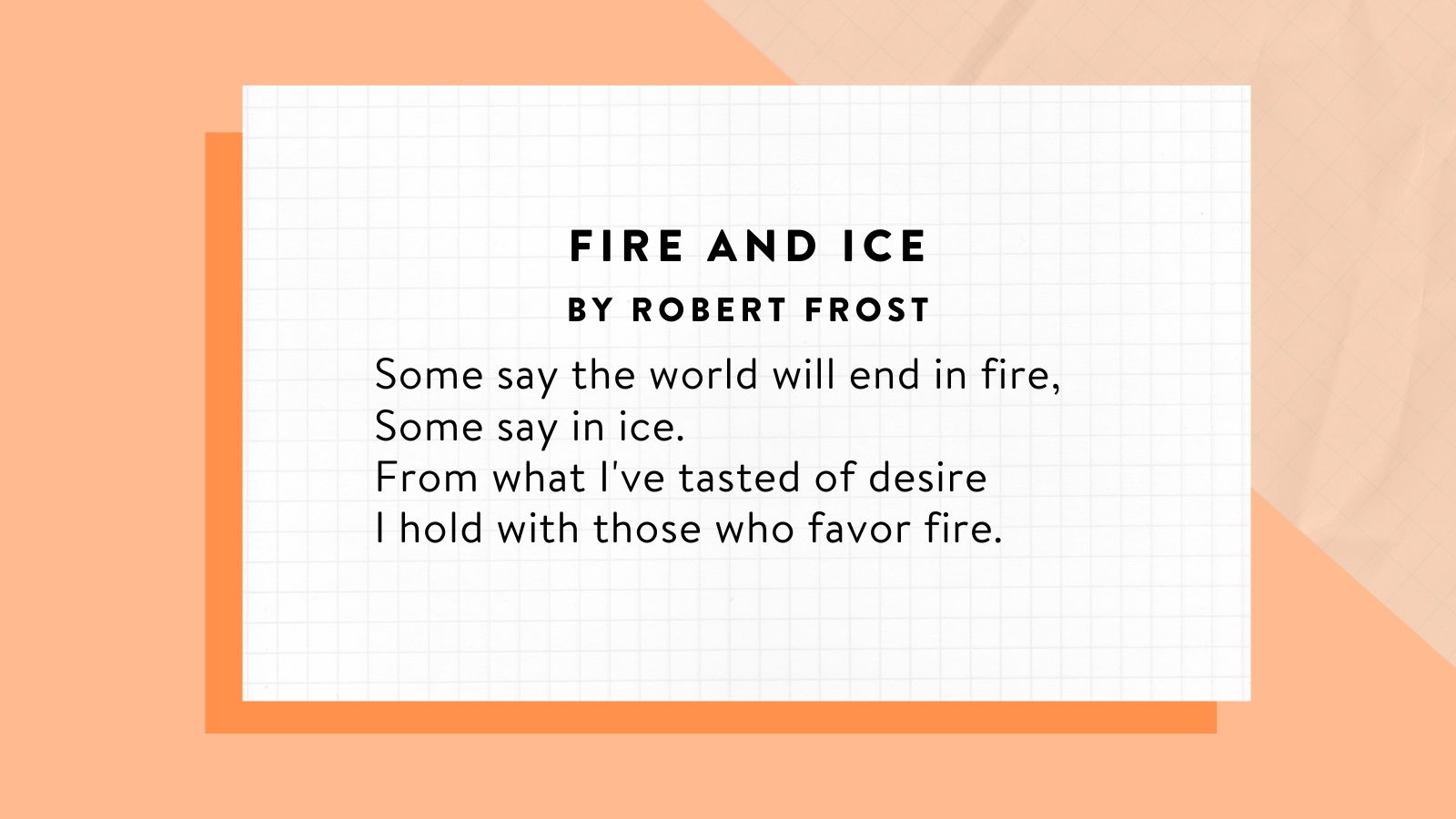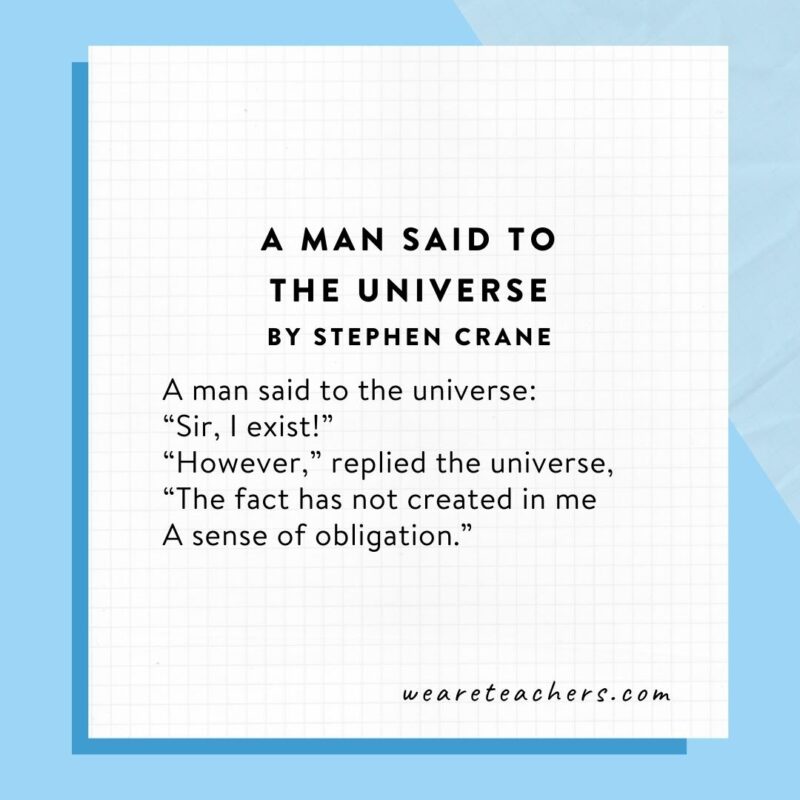It can be hard to know which poems will spur your middle and high schoolers into deep, meaningful discussion and which will leave them yawning. So we asked experienced teachers to share their favorite poems—the ones that always get a reaction, even from teens. Here’s what they had to say about the best poems for middle school and high school students.
Note: Every classroom is different, so please be sure to review these poems for middle school and high school students before sharing to ensure they align with your learning environment.
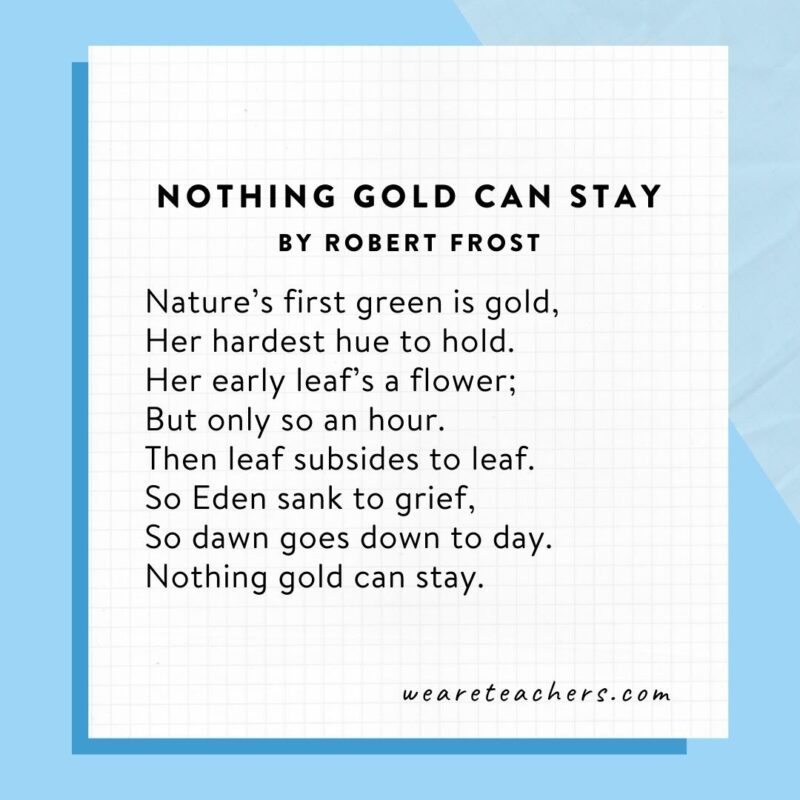
Discuss symbolism with this short poem by Frost.
“Two roads diverged in a yellow wood,
And sorry I could not travel both …”
Discuss the literal and figurative meanings in this poem.
3. Rat Ode by Elizabeth Acevedo
“Because you are not the admired nightingale
Because you are not the noble doe …”
Listen to the author herself as she performs her poetry.
“I lost my talk
The talk you took away.
When I was a little girl …”
This poem follows the pain and suffering Joe experienced at Shubenacadie Residential School in Nova Scotia.
5. Friend by Josephine Miles
“I met a man in a woolen reefer,
A friend of my friend’s.
What was his disposition?”
“when they said those birds were metaphors
for what is trapped
between buildings
and buildings. No.”
Recount the dangers of misconception with this poem.
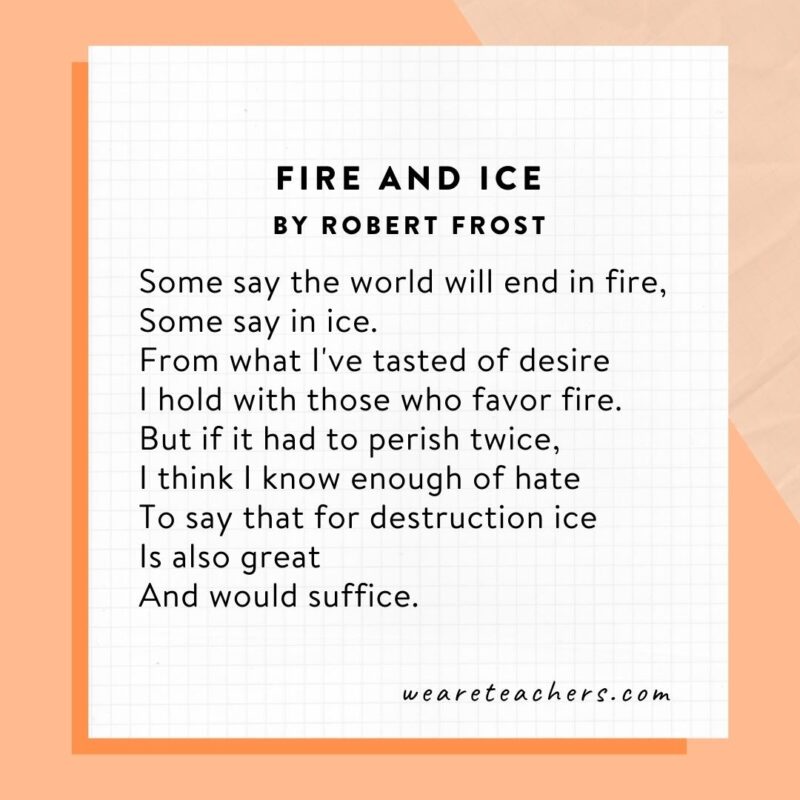
Frost doesn’t hold back with this poem, an ideal one for discussion and debate.
“I think I speak for the rest of us when I say
Sorry, sorry we left you with our mess of a planet …”
Ea documented this to raise awareness about the alarming rates of deforestation and the reckless destruction of our environment.
“The outlook wasn’t brilliant for the Mudville nine that day:
The score stood four to two, with but one inning more to play …”
An oldie but goodie!
“Funny it seems, but by keeping its dreams,
it learned to breathe fresh air.”
The late artist created a clear connection between the rhythm and deeper meaning of poetry and rap.
“‘Is there anybody there?’ said the Traveller,
Knocking on the moonlit door …”
For your fans of science fiction.
“We wear the mask that grins and lies,
It hides our cheeks and shades our eyes …”
A reaction to the experience of being Black in America in the late 19th century.
“You are not wrong, who deem
That my days have been a dream;
Yet if hope has flown away
In a night, or in a day …”
Poe was an expert at rhyme scheme—and this poem is clear evidence of that.
14. Deer Hit by Jon Loomis
“You’re seventeen and tunnel-vision drunk,
swerving your father’s Fairlane wagon home …”
Students won’t soon forget this poem, both for the story and the sensory details.
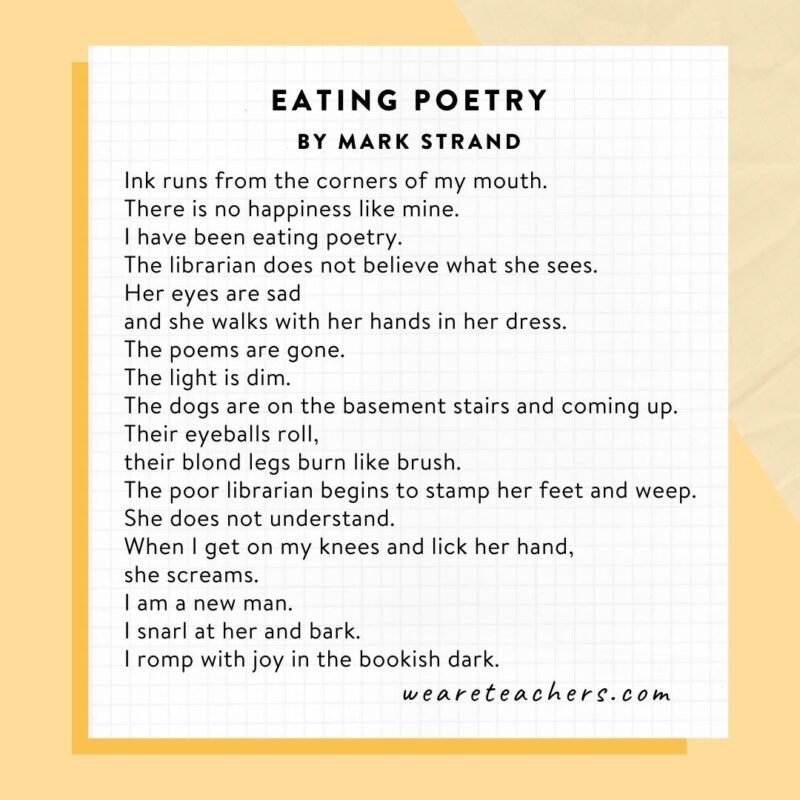
Read this poem to discuss the meaning beyond the literal words on the page.
“they own everything”
An example of just what one line can do.
Lerman engages with popular culture and an irreverent tone.
Any student who has ever felt annoyed or had to put up with daily frustrations will relate to this poem.
A politically charged poem that still rings true today, Hughes’ poetry, particularly “Mother to Son,” is timeless.
20. Beethoven by Shane Koyczan
This poem is a biography in verse that connects Beethoven’s story to the universal.
21. Oranges by Gary Soto
Soto’s poem about trying to impress a girl shows what small moments reveal about ourselves and how those moments embed themselves in our memories.
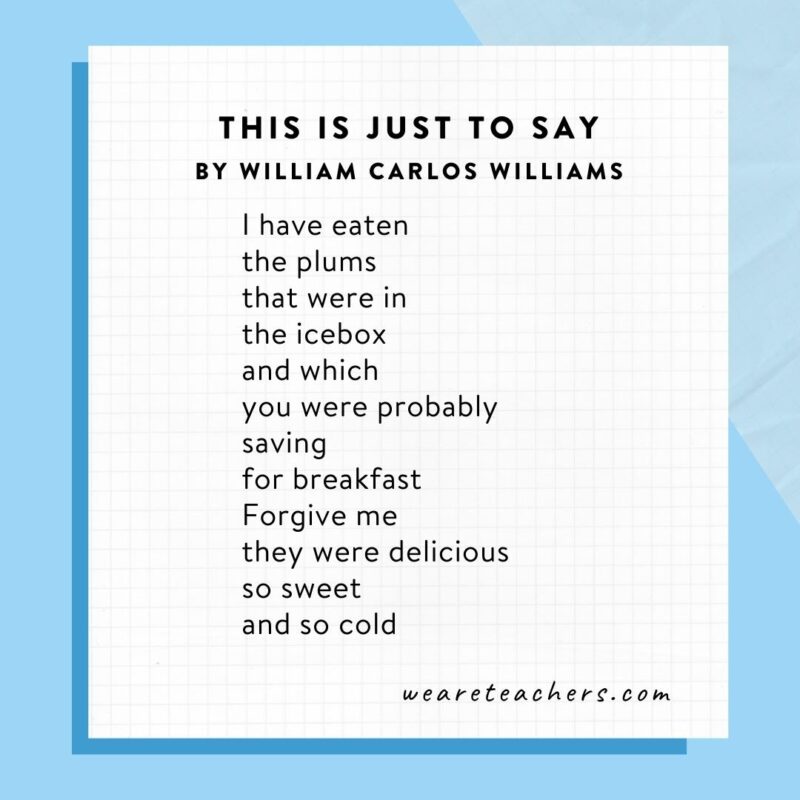
This poem leaves lots of space for inference, which leads to great discussion.
Teach this poem to show how O’Hara uses references or for the humor.
24. Pass On by Michael Lee
Lee’s poem creates snapshots of memory, creating lines and ideas for every student to grab and hold on to.
25. Snow by David Berman
Captures a narrative in miniature with a creative structure.
An uplifting political call to action that students should read right when they’re starting to define the mark they can have on the world.
Sheds light on the writing process, with a sense of humor and a tongue-in-cheek challenge.
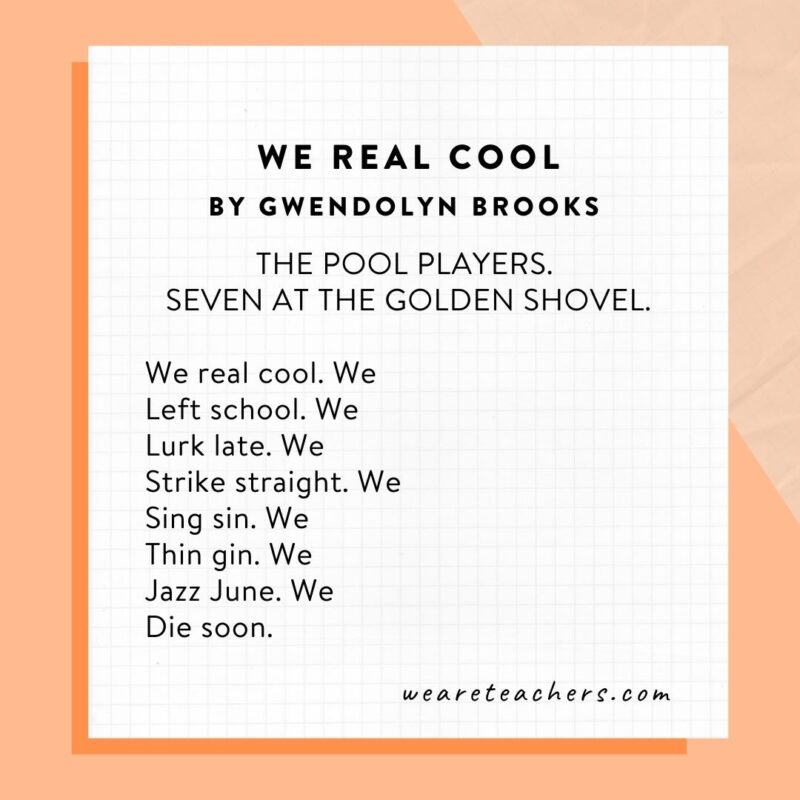
This poem is deceptive in its simplicity and leaves a lot to talk about. Be sure to discuss that internal rhyme!
A solid work for teaching poetry elements (repetition, rhyme scheme).
30. Daddy by Sylvia Plath
Plath rarely minces words and this is no exception—this poem is stuffed full of deeper meaning.
Dickinson is so good at creating mood, this time about reflection.
32. Annabel Lee by Edgar Allan Poe
A ghost story wrapped up in a poem. Another Poe classic.
The rest of the poem is as humorous as the title, and it’s fun to dissect and analyze how Neruda writes about everyday objects, like the tuna on ice.
Use this poem to teach ways to approach points of view.
Nash’s comical poem pokes fun at the use of similes and metaphors.
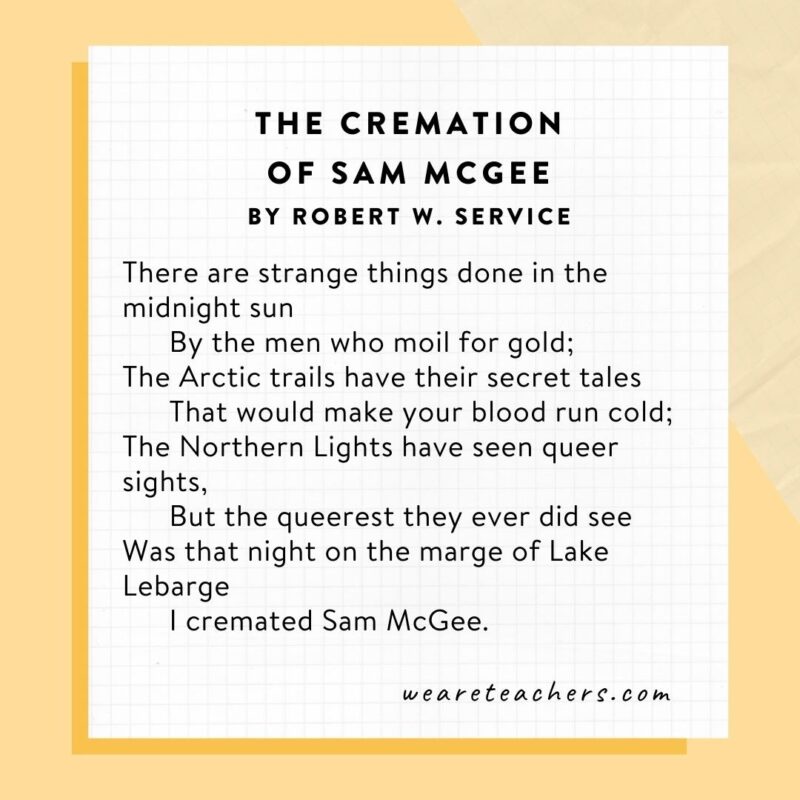
“There are strange things done in the midnight sun …”
When a highwayman meets the inn owner’s daughter, they fall in love immediately … as a rival eavesdrops.
“When Americans say a man
takes liberties, they mean
he’s gone too far.”
39. Mirror by Sylvia Plath
This poem speaks from a mirror’s perspective, sharing truths as a woman looks at her own reflection.
The poet clearly captures the elegance and beauty of this enchanting woman.
This short poem speaks volumes.
42. Richard Cory by Edwin Arlington Robinson
A surprise ending reminds us that not everything is always as it seems.
This poem encourages readers to make the most of each day.
44. Tattoo by Ted Kooser
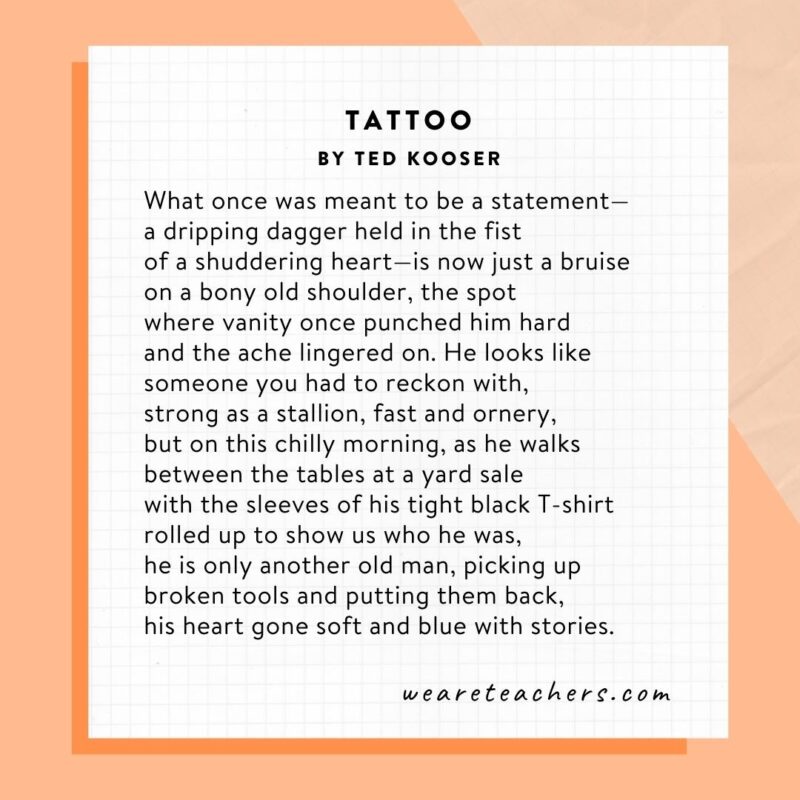
What stories can an old man’s tattoo tell us?
The author reminds us that regardless of our circumstances, the nature of death remains unchanged.
A poem about identity and wanting not to be famous. An interesting poem to analyze today, when students have multiple social media pages.
47. The Raven by Edgar Allan Poe
Have you even read poetry if you haven’t read “The Raven?” It’s a Poe classic, probably because of the evocative yet accessible language.
Wordsworth uses lots of great poetry tools in this poem. It is a good one for discussing metaphor and visualization.
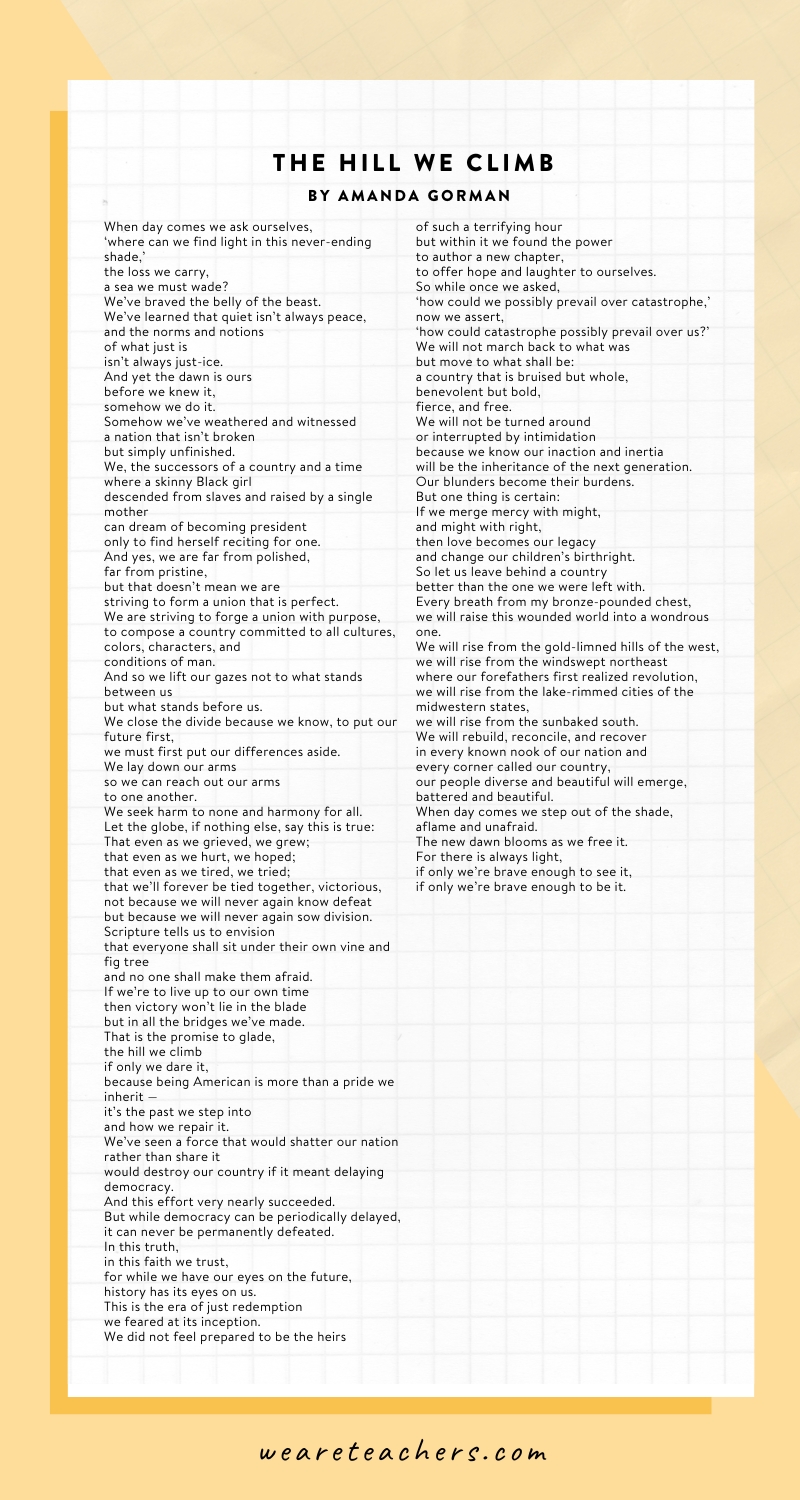
An amazing, modern poet that resonates with young people. Students will love pulling apart all the meaning in Gorman’s poem that was part of Joe Biden’s Presidential Inauguration.
50. If – by Rudyard Kipling
This poem will kick off some lively analysis as students make connections and pick apart Kipling’s message, which still rings true today.
“Whose woods these are I think I know.”
We recommend reading this poem on a snowy day, or at least a winter day, to capture the atmosphere of the prose.
52. Invictus by William Ernest Henley
“I am the captain of my soul.”
The final two lines of this poem are worth analysis all on their own. What does it mean to be the captain of your soul? How much control do we really have?
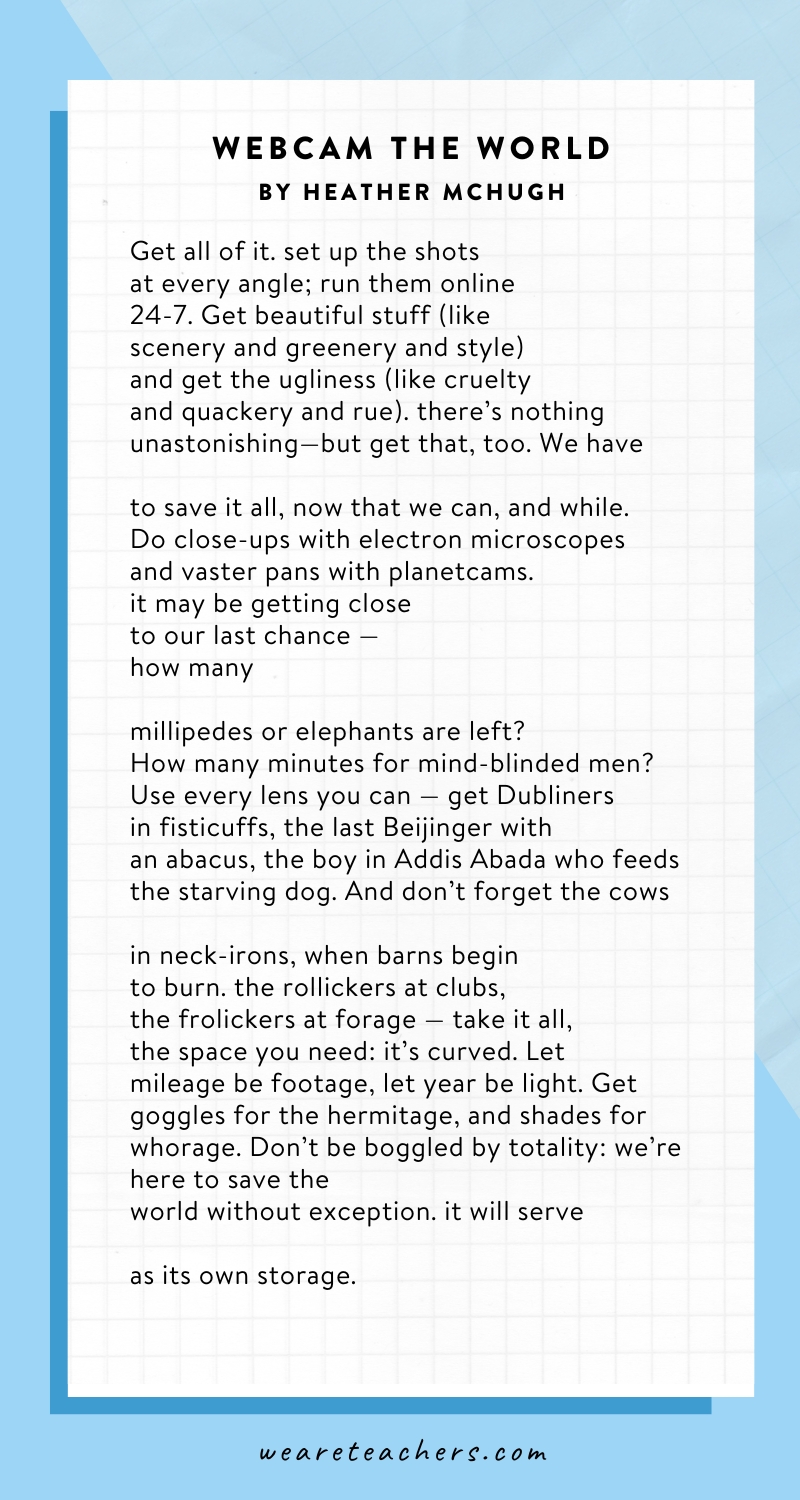
A statement on technology and nature, McHugh develops a very modern theme in a traditional-looking poem.
Stallings digs into her childhood dollhouse and reflects on what it means about childhood and the simple things in life. Even middle schoolers have nostalgia, and this poem will tap into that.
Another poem about perseverance. The message of this one is that we learn through failure.
A reminder for students that they should be true to themselves and be proud of that.
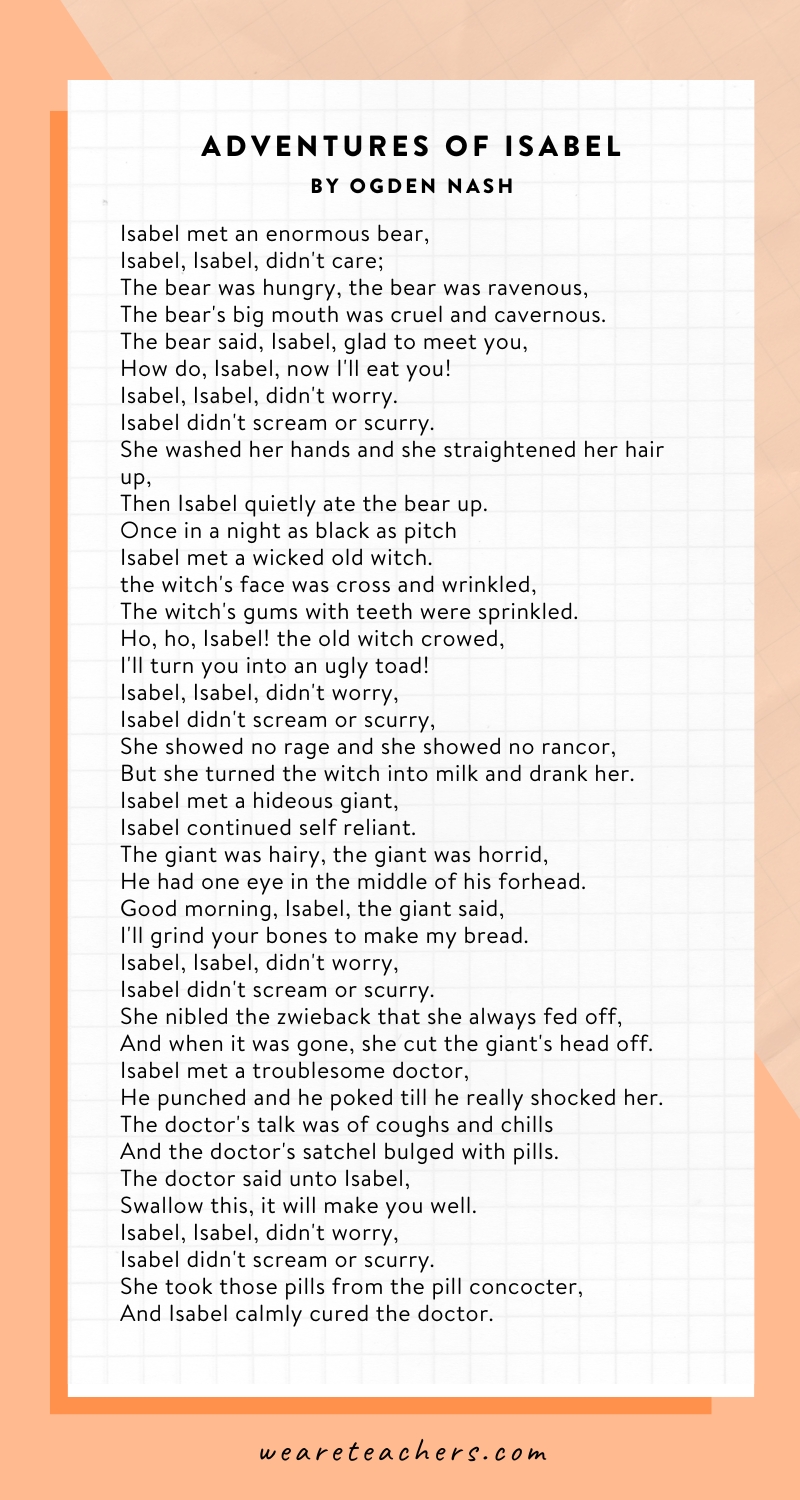
A great example of how poetry can be humorous and fun to read. Think Shel Silverstein for middle and high schoolers.
It’s silly to read an in-depth reflection about moving into double digits, but middle and high schoolers can see the humor in this poem, as well as the serious side.
A great read for Women’s History Month or any month. Angelou explores the stereotypes that are typically associated with women and what they mean.
60. Harlem by Langston Hughes
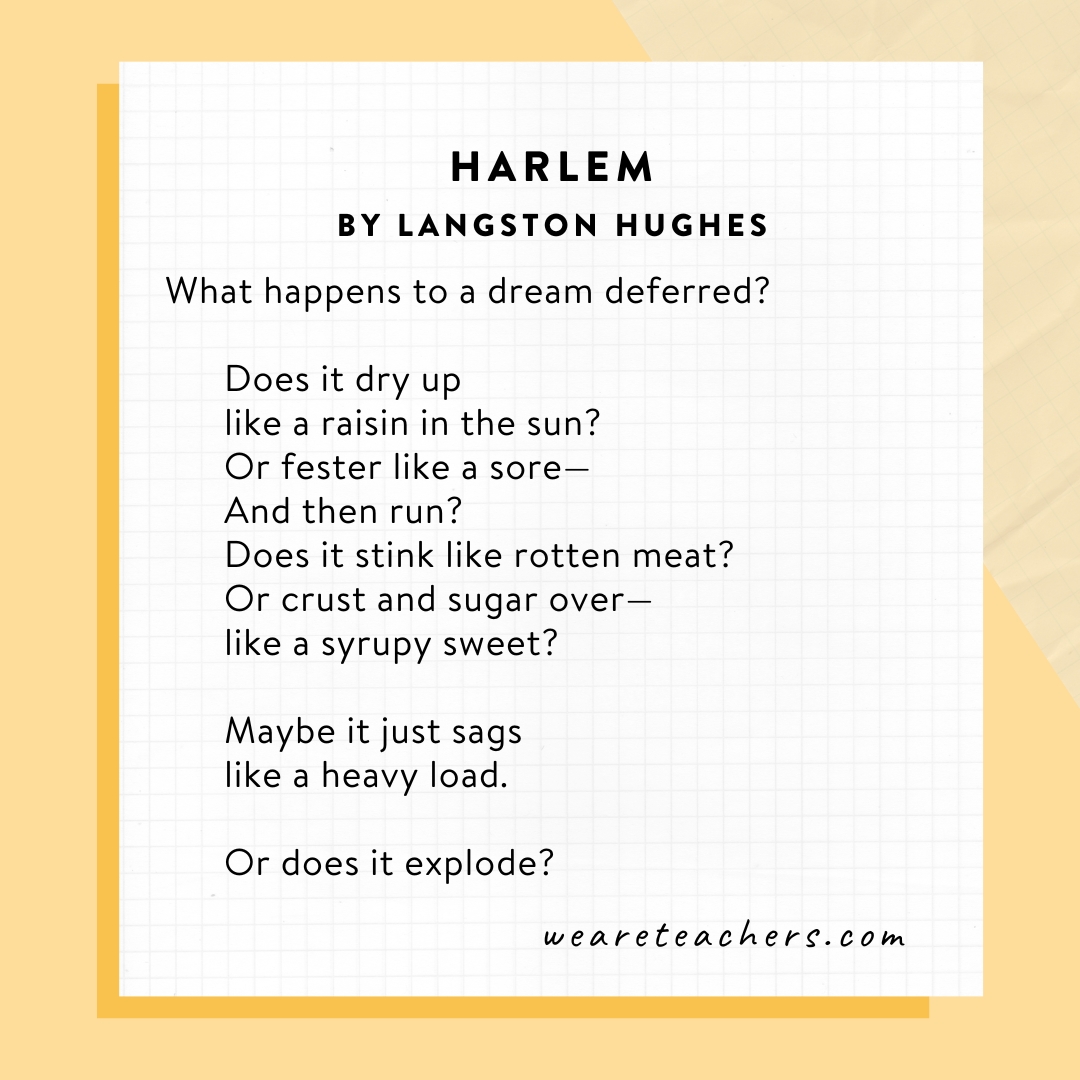
A poem that we can all relate to—the feeling of wanting things to happen that are not coming to fruition.

